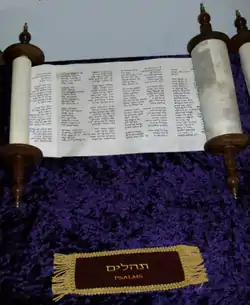Psalm 132
Psalm 132 is the 132nd psalm of the biblical Book of Psalms. It is the longest of the 15 psalms which begin with the words "A song of ascents" (Shir Hama'alot). Its author is not known.[1] In the slightly different numbering system used in the Greek Septuagint version of the bible and in the Latin Vulgate, this psalm is Psalm 131.
| Psalm 132 | |
|---|---|
 Scroll of the Psalms | |
| Book | Book of Psalms |
| Hebrew Bible part | Ketuvim |
| Order in the Hebrew part | 1 |
| Category | Sifrei Emet |
| Christian Bible part | Old Testament |
| Order in the Christian part | 19 |
Text
This psalm has 18 verses. The New Revised Standard Version associates it with "the Eternal Dwelling of God in Zion".[2] The Jerusalem Bible describes it as a "messianic hymn" and an "anniversary hymn" recalling the finding and translation of the Ark of the Covenant, which are recounted in 1 Samuel 6 and 2 Samuel 6 in the Hebrew Bible.[3] The words of verse 6, "we heard of it in Ephrathah", refer to the ark.
Verse 1
- Lord, remember David,
- And all his afflictions.[4]
The New International Version refers to David's self-denial.[5] Albert Barnes suggests that the specific afflictions under consideration were "his zeal, his labor, his trials in order that there might be a permanent place for [God's] worship".[1]
Uses
Judaism
- Recited following Mincha between Sukkot and Shabbat Hagadol.[6]
- Verses 8-10 are among those recited as the Torah scroll is placed in the ark.[7]
- Verse 13 is the fourteenth verse of Yehi Kivod on Pesukei Dezimra.[8]
Catholic Church
As St. Benedict of Nursia mostly attributed the last psalms to the vespers offices, this Psalm 132 was traditionally sung during the celebration of Vespers on Tuesday, according to the Rule of Saint Benedict, fixed at 530.[10][11]
In the current Liturgy of the Hours, Psalm 132 is recited at the Office of Readings on the Saturday of the first week of the four weekly cycle of liturgical prayers, and at Vespers on the Thursday of the third week. It is separated into two parts. In the liturgy of the Mass it is read for the feast of the Assumption.
Book of Common Prayer
In the Church of England's Book of Common Prayer, this psalm is appointed to be read on the morning of the twenty-eighth day of the month,[12] as well as at Evensong on Christmas Day.[13]
Musical settings
- "Let David Be Remembered" - Thaxted, Martin E. Leckebusch, 2003[14]
- Marc-Antoine Charpentier set one "Memento domine" H.155, for soloists, chorus, 2 treble instruments and continuo (?c1670)
References
- Barnes, A. (1834), Barnes' Notes on Psalm 132, accessed 16 June 2022
- Psalm 132:1: NRSV
- Jerusalem Bible (1966), Psalm 132
- Psalm 132:1: New King James Version
- Psalm 132:1: NIV
- The Complete Artscroll Siddur, page 530
- The Complete Artscroll Siddur, page 148
- The Complete Artscroll Siddur, page 66
- Kirkpatrick, A. F. (1901). The Book of Psalms: with Introduction and Notes. The Cambridge Bible for Schools and Colleges. Vol. Book IV and V: Psalms XC-CL. Cambridge: At the University Press. p. 840. Retrieved February 28, 2019.
- Règle de saint Benoît, traduction de Prosper Guéranger,(Abbaye Saint-Pierre de Solesmes)p. 47.
- Psautier latin-français du bréviaire monastique, p. 504, 1938/2003.
- Church of England, Book of Common Prayer: The Psalter as printed by John Baskerville in 1762, pp. 298-299
- "The Book of Common Prayer: Proper Psalms On Certain Days" (PDF). The Church of England. p. 6. Retrieved 19 April 2023.
- "Let David Be Remembered (Psalm 132)". Hymnary.org.